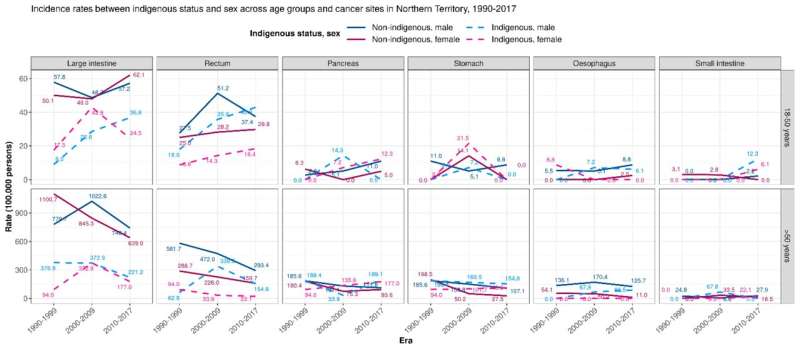Trend in incidence rates by Indigenous status, sex, and era between two age groups across cancer sites, 1990–2017 (n = 1608). Credit: Cancers (2022). DOI: 10.3390/cancers14122870
Survival rates for gastrointestinal (GI) cancer among Northern Territorians have improved in the past 30 years but Aboriginal and Torres Strait Islander peoples living in the Territory still have worse survival outcomes, a new analysis has found.
"We need a concerted effort aimed at investigating the existence of modifiable sociodemographic factors underlying these disturbing trends," says study senior author Associate Professor Savio Barreto, a general surgeon at Flinders Medical Center and researcher with Flinders University.
"There is a need to enhance preventative strategies, as well as to improve the delivery of cancer care and its uptake amongst Indigenous peoples."
The study, published in the journal Cancers, reviewed data from the Australian Northern Territory's Cancer Registry between 1990 and 2017, looking at adenocarcinomas of the esophagus, stomach, small intestine, colon, rectum and pancreas, which are collectively known as GI cancers.
A total of 1,608 cases of GI cancers were recorded during this period, with the overall rate among people aged 18–50 years remaining unchanged, although there appeared to be a slight trend towards an increase.
For those aged over 50, cancer rates decreased over the 30-year period. Overall survival rates also improved across all age groups, when compared to 1990–1999 figures, driven solely by an improvement in colon cancer survival.
A similar study analyzing South Australia's GI cancer rates was published earlier this year by the same research team.
"Our recent analysis showed that the incidence rates for young-onset GI adenocarcinomas are similar in the NT compared to South Australia," says Associate Professor Barreto.
"Unlike in South Australia, where there was a significant difference in incidence and survival amongst young-onset patients by sex, the overall incidence rates and survival rates for GI adenocarcinomas were not different between sexes in the NT."
While the rates of cancer were significantly lower among Indigenous people (who make up 31% of NT's population) compared to non-Indigenous patients, driven by comparatively lower rates of colon cancer, the study showed the former had a significantly worse overall survival.
Alongside increasing rates of young-onset GI cancers seen in the South Australian data, the authors say the NT analysis demonstrates a need to understand these trends and work towards improved outcomes.
"As young-onset colorectal cancer is being more commonly diagnosed in patients without a family history, it is unlikely that reducing the age of screening based on family history will improve survival rates," says co-author Professor Claire Roberts, a Matthew Flinders Fellow at Flinders University.
However, the authors acknowledge a recent modeling study which found that reducing the screening age for Aboriginal and Torres Strait Islander people would be cost-effective and save more lives. For the NT, Associate Professor Barreto and Professor Roberts agree that there may be value in a reconsideration of lowering the age limit for cancer screening, especially for Aboriginal and Torres Strait Islander people.
The authors say another consideration is lifestyle factors, with obesity, diet, smoking and alcohol exposure well-documented risk factors for young-onset GI cancers.
"The NT records the highest percentage of both daily smokers and alcohol consumers who exceed the recommended number of daily standard drinks, compared to the rest of Australia," say the authors.
"As adverse consequences of colonization on Indigenous populations globally continue to impact their socioeconomic and health status—both of which are consistently associated with poor cancer survival—it is vital we understand the inequity in young-onset cancer so we can better inform cancer preventative strategies," says Professor Roberts.
More information: Mia Shepherdson et al, Young-Onset Gastrointestinal Adenocarcinoma Incidence and Survival Trends in the Northern Territory, Australia, with Emphasis on Indigenous Peoples, Cancers (2022). DOI: 10.3390/cancers14122870
Provided by Flinders University
























